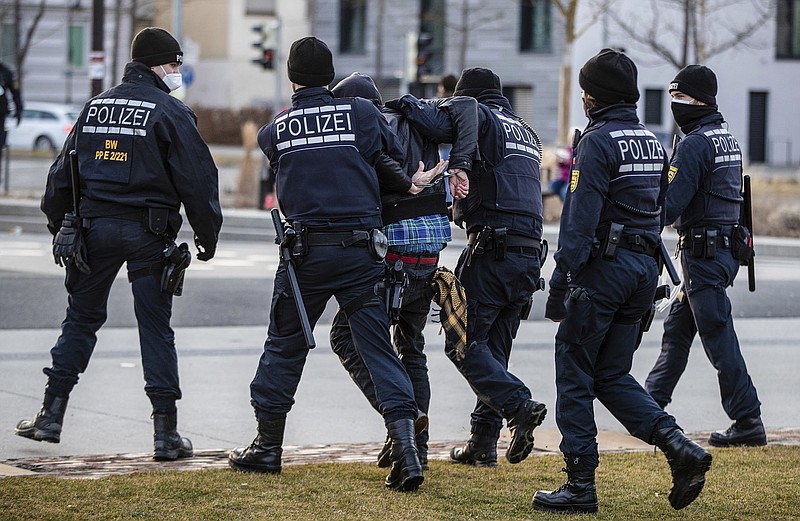Governments around the world are pushing to scrap some of their last remaining pandemic measures, despite warnings from health officials that the coronavirus is not going away.
With the exception of China, which is sticking to zero-covid policies, governments are struggling to maintain a cautious approach after two years of restrictions that disrupted work, shopping and travel. The most severe measures shut down businesses, pushed workers out of jobs and triggered government borrowing to shore up economies.
U.K. Prime Minister Boris Johnson accelerated his nation's plans last week, announcing that England's last restrictions will end later this month. Norway and Denmark have already ditched most restrictions. And self-isolation rules have been scrapped in South Africa, where the fast-spreading omicron variant was first identified.
Even Germany, which has moved slowly to rescind its pandemic restrictions, is planning to further loosen its rules despite setting records for infections on a daily basis.
Among public health experts, there's concern that politicians have missed the lessons from the crisis and will be caught flatfooted if a new wave hits. They note that the virus is still circulating, new variants could emerge, and next winter could spark another seasonal surge.
"For the past two years, we have misused the opportunity of the spring and summer, where behavior limits transmission, not to make good on the hard-earned control from harsh lockdowns," said Stephen Griffin, a virology professor at the University of Leeds. "The promises around there not being a need for further restrictions in the future have proven hollow."
Soumya Swaminathan, chief scientist at the World Health Organization, said it's "foolish" to drop all precautions now.
In nations such as Norway, restrictions have eased as leaders say they don't see a major health threat for residents any more, even though the omicron variant is still spreading.
"This is the day we have been waiting for," Norwegian Prime Minister Jonas Gahr Stoere said Saturday as he announced that his country was lifting almost all of its remaining covid-19 restrictions.
He justified the move by saying that Norwegians are well-protected by vaccines and that the proportion of residents who end up in hospitals has remained low.
As of Saturday, Norwegians were no longer required to wear masks in crowded places, and a 3-foot distancing rule was abolished. In addition, self-isolation requirements were replaced with a recommendation that infected adults stay at home for four days.
But given the uncertainty about future covid-19 variants, potential spikes in infections and the risks of future pandemics, leaders around the world will need to stay ready, according to Richard Hatchett, who leads the Oslo-based Coalition for Epidemic Preparedness Innovations.
"It's likely the case that the public will be able to enjoy some well-deserved relaxation as omicron subsides, but it's incumbent on governments not to forget that we don't know what's coming next," said Hatchett, a former White House adviser.
Expanding home testing, improving ventilation in public buildings, increasing efforts to track mutations, and developing better vaccines and drugs that can work against a broad range of variants and other diseases are all part of the toolkit.
"The bottom line is that from a government perspective, from a risk-management perspective, we have to make investments with an assumption that we might have a bad scenario," even if it's less likely, Hatchett said.
JAPAN RESTRICTIONS
In Japan, leaders are considering whether to ease that nation's border controls amid growing criticism that the measures, which have banned most foreign entrants, are hurting the country's economy.
"I plan to look into easing the border controls," Prime Minister Fumio Kishida told reporters Saturday.
Kishida did not provide a timeline or other details, but he said he will make a decision based on a scientific assessment of the omicron variant, the infection levels inside and outside Japan, and the quarantine measures in other countries.
Kishida announced his plan after visiting Tokyo's Haneda international airport, where he observed quarantine areas and a vaccination rollout for airline workers.
Most of Japan is under virus-related restrictions, but infections have shown little signs of slowing. Japan reported nearly 100,000 new cases in its latest 24-hour period, including 18,660 in Tokyo.
The current border measures are scheduled to remain in place until the end of February.
The border rules, which allow entry only for Japanese citizens and permanent foreign residents, have drawn criticism from foreign students and scholars who say the measures are unfair and unscientific, and that they force talented visitors to go to other countries. Hundreds of thousands of people have been affected.
Frustrated students have started gathering outside Japanese diplomatic compounds around the world to protest the measures. Japanese and foreign business groups have also raised concern about the restriction, saying the prolonged border closure has affected investment, business deals, product development and deliveries. Experts also say the border policy is further delaying recovery in Japan's economy.
Many members of the Japanese public, however, have supported the tight border controls, arguing that troubles such as the pandemic come from outside their island nation.
Information for this article was contributed by Fergal O'Brien, Tim Loh and James Paton of Bloomberg News (TNS); and by Mari Yamaguchi and staff members of The Associated Press.
Gallery: Coronavirus scenes, 2-12-2022

